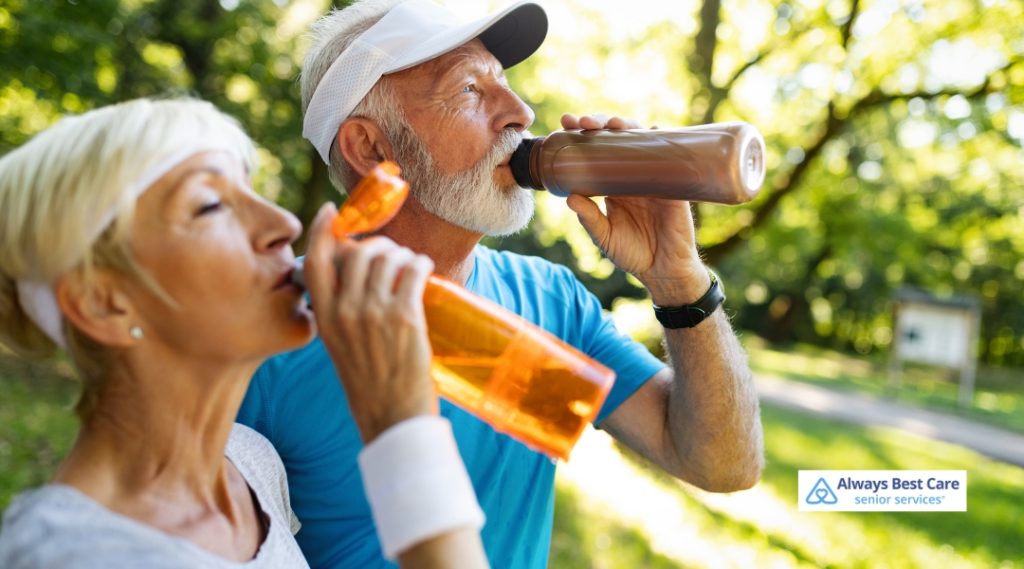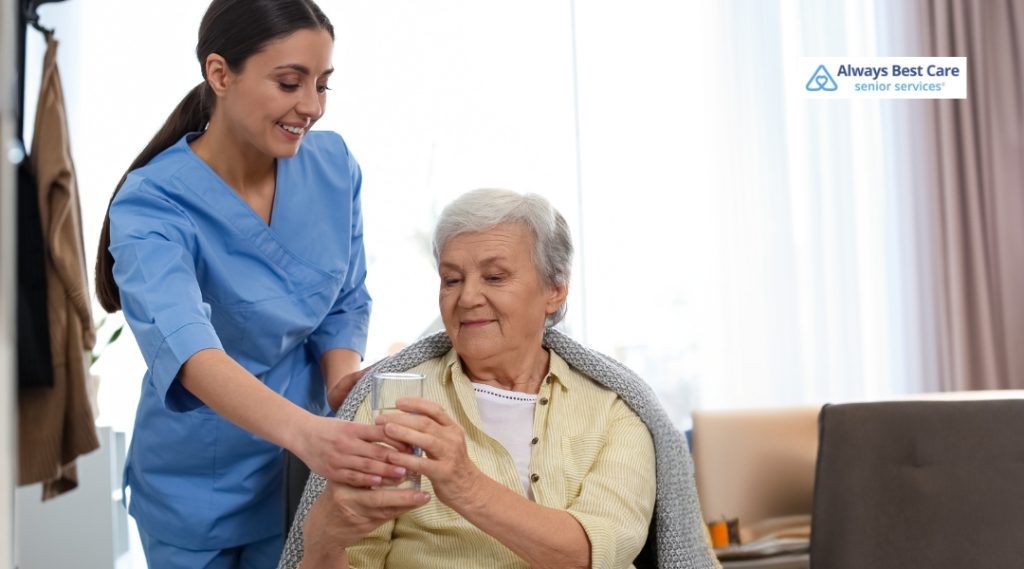Don’t Overlook Hydration: How Drinking More Water Boosts Senior Health

Staying hydrated isn’t always at the top of everyone’s to-do list, but for our senior loved ones, it’s absolutely essential.
As we get older, our bodies undergo natural changes that can significantly increase the risk of dehydration.
Yet many seniors simply don’t consume enough water throughout their day.
With National Hydration Day coming up, there’s no better time to shine a light on this critical aspect of senior health.
Understanding water’s vital role can help families support their aging loved ones in maintaining proper hydration levels for better health and vitality.
What you will learn:
- Why hydration is especially vital for seniors and how it supports their energy, cognitive function, digestion, and mobility.
- Simple, practical tips to help seniors increase their daily fluid intake and make staying hydrated easier and more enjoyable.
- How professional caregivers can assist with hydration and monitor for signs of dehydration, ensuring seniors stay healthy and comfortable.
Table of Contents
Why Water Matters More as We Age
Water isn’t just refreshing; it’s the foundation of good health at any age. For seniors, though, staying hydrated becomes even more crucial for several key reasons:
Boosting Energy Levels
Proper hydration helps maintain adequate blood volume, allowing oxygen to travel more efficiently throughout the body, which supports stamina and daily activities.

Supporting Brain Function
For seniors, particularly those already experiencing cognitive changes, staying well-hydrated helps maintain mental clarity and reduces confusion.
Improving Digestive Health
Water acts as nature’s lubricant for the digestive system, helping food move smoothly through the intestines. Without enough fluids, digestion slows down, leading to discomfort that can affect appetite and overall nutritional health.
Maintaining Mobility
Proper hydration supports healthy muscles and joints by keeping tissues well-lubricated.
Seniors who drink enough water often report less stiffness and joint discomfort, which helps them stay active and independent longer.
5 Practical Tips for Better Hydration
If your loved one struggles to drink enough water, don’t give up! Try these simple but effective approaches:
- Offer a variety of hydrating options beyond plain water: Herbal teas, milk, broth-based soups, or water infused with fruits and herbs can be more appealing.
- Incorporate water-rich foods like watermelon, cucumber, oranges, and strawberries into meals and snacks.
- Set up gentle reminders throughout the day, especially with meals or when taking medications.
- Provide easy-to-hold cups and water bottles that don’t require much grip strength.
- Check urine color as a simple indicator: Pale yellow typically signals proper hydration, while darker urine suggests more fluids are needed.

How Always Best Care Can Help
Keeping track of hydration can be challenging, especially if you can’t be with your loved one throughout the day. That’s where we at Always Best Care come in. Our professional caregivers are trained to assist with all aspects of daily living, including ensuring proper hydration.
Our caregivers can:
- Prepare hydrating meals and beverages.
- Provide regular, gentle reminders to drink water.
- Monitor for signs of dehydration, like dry mouth, headaches, or dizziness.
- Address barriers that might prevent adequate fluid intake, such as mobility issues.
Frequently Asked Questions
Q: How much water should seniors drink daily?
A: While needs vary by individual, most older adults should aim for 6-8 glasses of fluid daily, including water and other hydrating beverages.
Q: Can coffee and tea count toward daily fluid intake?
A: Yes, though in moderation. While caffeinated beverages have a mild diuretic effect, they still contribute to overall hydration. Herbal teas are an excellent alternative.
Q: What are the warning signs of dehydration in seniors?
A: Look for dry mouth, fatigue, dizziness, confusion, less frequent urination, dark-colored urine, and increased thirst.
Q: Should seniors drink water even if they don’t feel thirsty?
A: Absolutely! The sensation of thirst diminishes with age, so seniors should drink regularly throughout the day, even when not feeling thirsty.

Take the First Step Toward Better Senior Health!
Need a helping hand? We at Always Best Care are just a phone call away. Our compassionate caregivers can ensure your loved one stays well-hydrated while living comfortably at home.
Contact Always Best Care of San Antonio at (210) 772-2277 to learn more and schedule your free consultation.





